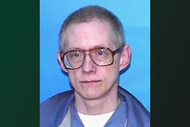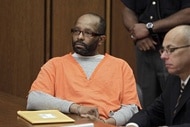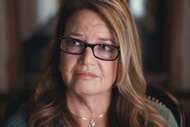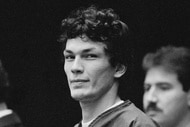Is Haley Joel Osment's Character In 'Extremely Wicked' Based On A Real Person?
In Netflix's "Extremely Wicked, Shockingly Evil And Vile," the character Jerry is her protector, but did Elizabeth Kloepfer have a real-life love interest to thwart Ted Bundy's attempts to contact her?

After a tumultuous relationship with Ted Bundy (you know, the infamous serial killer who murdered at least 30 women), his former girlfriend Liz Kendall, based on real-life Bundy girlfriend Elizabeth Kloepfer and played by Lily Collins in the film, finds a quiet protector and a safe haven with her coworker Jerry in the movie “Extremely Wicked, Shockingly Evil and Vile.”
Jerry, portrayed in the film by Haley Joel Osment, tries to shield Kloepfer from Bundy’s manipulative and continued attempts to contact Kendall from prison by secretly unplugging her phone, urging her to cut off communication with him, and assuring her that she did the right thing by reporting Bundy as a possible suspect to police.
“You can’t call her anymore. You’re killing her,” he tells Bundy after intercepting one of the calls in the movie, which starts streaming Friday, May 3.
But was the Jerry character based on a real person?
Joe Berlinger, director of the movie, told Oxygen.com Jerry and the character Joanna, portrayed by Angela Sarafyan as Kloepfer’s best friend, were both “composites” of several people in Kloepfer’s life.
“She had several male figures and several female figures in her life as positive influences, but it just made it easier to reduce them to single composite characters,” he said.
Kloepfer wrote about her network of support in the book “The Phantom Prince: My Life with Ted Bundy,” which served as the basis for the movie.
In the book, which she wrote under the pen name Elizabeth Kendall, she describes having a sympathetic boss, supportive parents, and a best friend known in the book as “Angie,” who she discusses her suspicions with at length before Bundy’s arrest.
There is also a romantic interest she refers to as “Hank” who appears in her life around the time Bundy escaped from prison a second time to flee to Florida, where he’d brutally murder and attack residents of a sorority house.
She describes Hank as a handsome, big, and strong guy who she met in an Alcoholics Anonymous meeting.
“Although we didn’t have a lot in common other than our recovery from alcoholism, he made me feel safe,” Kloepfer wrote. “He began to stay with me even at night.”
Kloepfer was afraid Bundy may come to see her after he escaped and agreed to let the FBI put a tap on her phone, which would tell investigators the location of where a caller was if Bundy happened to call.
But the tap had not been put on the phone yet when Bundy called on February 16, 1978 after getting picked up by the police in Florida.
Kloepfer asked Bundy whether he was trying to tell her he was “sick” during the call, but he quickly barked that she should “back off” and the conversation turned to other things, including Kloepfer’s dating life.
She told him she had fallen in love with someone and Bundy responded, “He’s a lucky guy,” according to her book.
"My friend Hank came into the bedroom where I was and demanded that I get off the phone. (My daughter) had told him that I was talking to Ted. I shook my head, no. Hank stormed out and I soon heard his truck roar away. Ted and I kept talking,” she said.
Hank later returned that night and Bundy asked to speak to him on the phone.
“Hank looked so agitated that I thought he might throw up, but he was answering ‘I know’ and ‘I will’ to Ted’s exhortations to take good care of me and (my daughter),” she said.
Kloepfer said Hank told Bundy, “May God have mercy on your soul,” before handing the phone back to her.
When Bundy called back later that night, Hank answered the phone and refused to accept the charges.
The next Saturday Bundy would call again at 2 a.m. and confess that he suffered from a sickness he “couldn’t contain” while Hank looked on.
“Hank had come into the living room and was motioning me to get off the phone,” she wrote. “I shot him my fiercest go-to-hell look.”
Little is known about Kloepfer’s life after Bundy’s conviction or whether her relationship with Hank continued, but she was able to finally let go of Bundy eventually, writing that the feelings she once had that he should not be in prison had “turned to outrage that he had coldly, capriciously murdered all those women.”
Her recovery, was in part, aided by a strong support system.
“I am also thankful for my parents and my family who love me no matter what, for my eighty-four-year-old aunt who teaches me how to live and love by her example, for my friends who are always there when I need them (and I need them lots), for Hank who helped me break away from a destructive relationship, for Angie who helps me grow spiritually, for my AA sponsor who made me learn about myself, but most of all for my daughter, who is a very, very special young woman,” Kloepfer wrote.


























